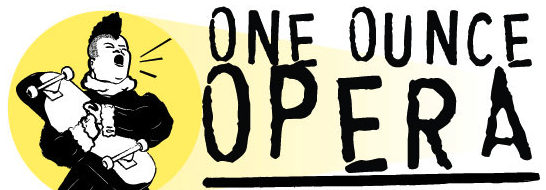Meet the composer and librettist of Ray Bradbury, Age 12, at the Carnival in Waukegan, IL, one of the three winning micro-operas for FSOO 2025!
Often the most poignant and powerful dialogue happens between those who create and those who perform. That’s why OOO connects our singing-artists with the composers and librettists selected for the 7th Annual Fresh Squeezed Ounce of Opera.
If you’re curious about the story inspiration, what to listen for, what to expect, and more, you’re in the right place.
Here, get the scoop behind the story of Ray Bradbury, Age 12, at the Carnival in Waukegan, IL, written by Tyler Mabry – with questions from the cast – designed to enhance your experience. Bonus: you will be among the very first to hear this work, making its World Premiere!
First, a quick synopsis:
The true story, as (very) often told by beloved American author Ray Bradbury (Fahrenheit 451, Something Wicked This Way Comes, The Martian Chronicles), of the mysterious, fantastical Dill Brothers Circus that sparked his interest in becoming a writer. A cascading carousel of wonder!
What led you to uncover this specific anecdote from Ray Bradbury’s life? Is this experience, which influenced him both personally and as a writer, something that has resonated with you for a long time, or was it a recent discovery that sparked the creation of this work?
Tyler: I have admired Bradbury’s work since I was a 12 year old boy myself, but I only recently learned about his boyhood encounter with Mr. Electrico. The story immediately resonated with me, for personal as well as literary reasons. When I came to Austin in the 90s, I was fairly young and sheltered, but I was fortunate to have encounters and friendships with people who — like Mr. Electrico — introduced me to the city’s musical and theatrical scenes. Coming from a rural and conservative background, as I did, I met many people who at first seemed very strange to me, like they were from a different universe! But it was an incredible universe, and I knew that I wanted to belong to it. Those connections absolutely transformed my life.
What was it about this story that led you to adapt it into an opera?
If there was one detail that solidified my decision to make this into an opera, it was the moment when Mr. Electrico stands with young Ray by the lake to tell him “you were my best friend in France, and you died in my arms in the battle of the Ardennes Forest.” When I saw that, I thought to myself, “now THAT is an aria!” I love opera subjects that are larger than life, and I’ve always been attracted to dramatic works based on real events. So this story seemed like a natural fit.
How important was it for the music to evoke a sense of nostalgia, considering Ray reflects on this experience in the opera? Did you incorporate any musical references to the time and place in which the story is set?
In the opening passages, when “adult Ray” begins the story, there is certainly a nostalgic sensibility. Specifically, when he sings “I have told the story many times, always in wonder,” there is a very dreamy and sentimental sequence in the accompaniment. And at the end of the opera, when adult Ray reappears to take the stage with his memories, it becomes nostalgic again, this time spiked with contemplative mystery. But in between, I was not particularly thinking of the events as nostalgic, because they are happening to young Ray in real time! As far as musical references go, the most explicit reference is certainly “Beautiful Ohio” – I’ll talk more about that in an answer to Nicholas’s question down below.
Between a fantastical Mr. Electrico, who embodies power and immortality, but is brought back to a time of vulnerability, and young Ray who is confronted with themes of death, life, and immortality, you have a range of complex characters to convey in such a short period of time. How did you navigate these contrasts?
I love this question! Character contrasts are the heart of the piece; in many ways, the opera is constructed around juxtapositions. You can communicate a great deal about characters through the music itself. “Come Away,” which introduces the carnival performers, is showy and energetic and a little unstable — we see a performative, imposing side of Mr. Electrico, with his promises of immortality. Then young Ray comes bursting in with a very eager, frantic, and almost naïve melody. Later on, as Mr. Electrico reveals his beliefs about Ray’s past life, there is some polytonality to suggest an uneasy overlapping of the past and present. As you say, it is a very short opera, and so these contrasts and these interrelationships have to be established quickly. But the emotional core of this opera is the wonder and mystery of our impact on one another’s lives. By the time we arrive at the final trio, and Adult Ray, Young Ray, and Mr. Electrico sing “Live forever!,” my hope is that this phrase, (which was originally pronounced in the middle of a carnival act!) has grown in weight and poignancy. In some strange but meaningful way, Ray has accepted Mr. Electrico’s promise of immortality.
To what degree did the setting influence the score? How did you infuse the carnival into the music?
I love circus and circus-adjacent music, from traditional circus repertoire to Nino Rota to dark cabaret! The most noticeably circus-influenced music in the show is in the song “Come Away,” which establishes the carnival scene – it has a kind of lopsided oom-pah rhythm, with a bass ostinato alternating between 6/8 and 5/8, which gives it a rhythm that is driving and stylistically familiar but also off-kilter and destabilizing. And the opera ends in front of the carousel, so the setting for the final song is certainly influenced by the steady, slightly woozy rhythm of the carousel.
One of the inspiration articles you shared with us mentioned that Ray’s uncle had just passed prior to him going to the carnival. From your perspective, if Ray hadn’t just had that brush with death would the carnival still have had the same impact on him? And if not, how would his journey as an author have been altered?
I have thought about this a lot, actually! I think that Ray was grappling with two kinds of death simultaneously – the “death of the spirit,” represented by his rejection of his own creative and imaginative life in order to conform with his peers, and also, as you mention, the death of his uncle. In the current libretto, I have given more explicit focus to the former. But the latter is very important as well! In one telling of the story, RB says that he was in the car, on the way to his uncle’s wake, when he got out and began running, returning to the carnival so that he could see Mr. Electrico again. “I was running away from death wasn’t I? I was running toward life.” If I ever work this micro-opera into a longer-form piece, the plot would probably involve Ray visiting the carnival twice, with the funeral and the family mourning happening in between those two visits.
Of course we can’t ever know what Bradbury’s journey would have been like if these events hadn’t happened, but it seems that his encounter with Mr. Electrico, and with the circus atmosphere itself, was truly transformative. After young Ray went home, he began writing almost immediately, and he kept writing for the rest of his life.
The story takes place in Illinois, but the ending song is called “Beautiful Ohio.” Why was that song chosen? Did Ray Bradbury recall hearing it at the carnival?
I’m glad that you asked this! As you guessed, “Beautiful Ohio” is precisely the song that Ray Bradbury remembered hearing as he left the carnival. In his own words: “…when I left the carnival that day I stood by the carousel and I watched the horses running around and around to the music of ‘Beautiful Ohio’ and I cried.” Having said that, I certainly didn’t choose to end the opera this way only for the sake of historical accuracy. I was not actually familiar with the song, but when I looked up the words (which Bradbury never mentions) I felt that it was powerfully resonant with the themes I was trying to highlight in the story.
“Love had its start / then in my heart / and like a flower grew” – this is an apt description of what happened to Ray that day: the planting of something that will take root and grow! And then there is this phrase: “in dreams again I see visions of what used to be.”
Anyone familiar with the tune will notice that I’ve re-harmonized “Beautiful Ohio” fairly radically. Hopefully, the new harmonization imparts a haunting circus vibe to the beginning, and also adds emotional poignancy to the ending.
It seemed like the right ending to me! But on some level, I do wonder if people will leave thinking “Ohio? I thought it was Illinois!”
Watch One Ounce Opera’s live recording of Ray Bradbury…!
Get the scoop from the cast – watch the video below!



